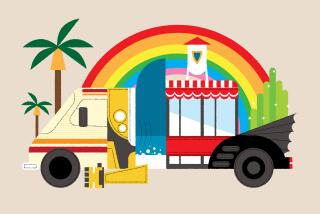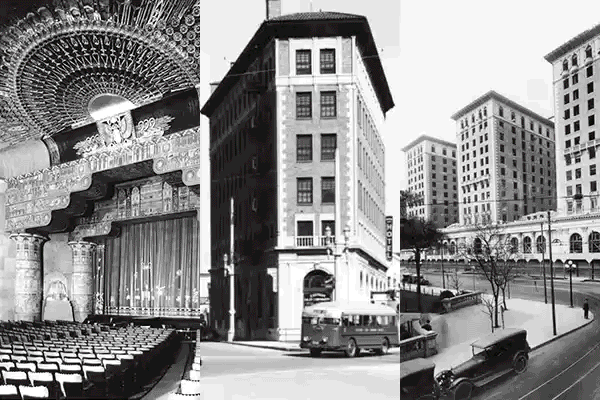At 75, Laemmle family’s theaters look to the future
- Share via
In the lobby of the historic Royal Theatre in West Los Angeles, Bob Laemmle points to a wall of glass-encased photos and letters from cinema luminaries of the last half-century.
“This is one of Ingmar Bergman,” he says proudly, gesturing to a photo of the Swedish director, his arm around the shoulder of Bob’s father, Max, taken during the 1972 premiere of “Cries and Whispers.”
Next to it is a letter from the director and actor Andre Gregory, thanking Max for a party he hosted in support of the 1981 movie “My Dinner With Andre.”
ON LOCATION: Where the cameras roll
Also on the wall is a chilling letter, dated Dec. 5 1935, from Kurt Laemmle to his brother Max, in which he urges his brother and parents to flee the Nazis and move to America, where their famous cousin, Carl Laemmle, had founded Universal Studios. Max followed his brother’s advice and the German-born brothers launched their theater chain in 1938.
Seventy-five years later, the family-owned chain has not only survived but thrived in an increasingly competitive climate, while retaining its reputation as one of the premier art house theaters in the country.
“If you look at the track record of family businesses that have made it, to have survived this many generations is quite a remarkable achievement,” said Greg Laemmle, the chief executive and third generation of his family to run the Los Angeles-based chain. “Not only are we still here, but we are in fact growing and committed to this business and this form of entertainment.”
PHOTOS: Billion-dollar movie club
Laemmle operates seven theaters with 34 screens in Beverly Hills, Claremont, Encino, North Hollywood, Pasadena, Santa Monica and West L.A. The chain has plans to open new venues in the next two years in Glendale, Newhall and Inglewood, where the company is in early discussions to renovate the historic Inglewood Fox Theatre as part of the city’s revival efforts.
In Glendale, city officials recently approved a $12.8-million mixed-used project called the Laemmle Lofts that includes a five-screen theater, 42 apartments and 6,000 square feet of commercial space. The Laemmle in Santa Monica is also being remodeled and is expected to open by year’s end.
The growth marks a turnaround for Laemmle, which in the last three years was forced to shut down several theaters, including its landmark Sunset 5 location and Fallbrook’s Laemmle 7 in West Hills, now occupied by AMC.
PHOTOS: Celebrities by The Times
Like other smaller chains, Laemmle has been squeezed by high rents and rising competition from large circuits like AMC and Cinemark, which are booking more art house and specialty films. Smaller players such as ArcLight Cinemas and Landmark Theatres also have grabbed market share by offering a mix of commercial and specialty movies along with premium services.
Laemmle has adapted to the heightened competition by expanding into less competitive regions, upgrading its theaters — including a $2-million renovation to the Royal in 2012 — and owning most of the locations where it operates. The circuit invested $7.5 million to build a new all-digital theater called NoHo7 in North Hollywood in December 2011. To avoid unforeseen rent increases, the company acquired the building, a practice it is now following on other projects, including the one in Glendale.
“We end up in a position of being able to control our own destiny,” Laemmle said.
The new strategy, combined with shedding unprofitable theaters, has markedly improved Laemmle’s business. The company, which generates up to $15 million in annual revenue, saw its profit jump 40% last year over 2012, Laemmle said.
This “was our best year in five years,’’ he said, adding such titles as “Mud” and the “20 Feet From Stardom” proved popular with audiences. “Demand for independent cinema is terrific. People enjoy good films.”
And Laemmle still has loyal supporters. To mark the 75th anniversary, friends and supporters gathered at the Royal to attend a screening of the 1966 Claude Lelouch’s classic “A Man and a Woman.” The benefit raised $100,000 for local charities, including Friends of the L.A. River.
The Laemmle brothers started operations with several neighborhood theaters, including the Franklin and the Park, in the Highland Park and Glassell Park neighborhoods. Like other theaters, the new company struggled with the advent of television and by 1955 had scaled back to one theater, the Los Feliz.
Unable to support two families, Kurt and his wife, Alyse, left the business to pursue a career in insurance. Max’s son, Robert, took over the business in the 1960s and led the chain through a period of expansion, eventually opening a dozen locations.
Max Laemmle is widely credited for being one of the first U.S. exhibitors to expose American audiences to the work of such directors as Francois Truffaut, John Sayles, Pedro Almodovar and Akira Kurosawa, whose film “Ran,” the Japanese version of Shakespeare’s “King Lear,” debuted at the Royal, as did the 1992 film “Howards End.”
“The Laemmle family is one of the great family owners of independent theaters in America,” said Michael Barker, president of Sony Pictures Classics, which released “Howards End.” “Their operation has stood the test of time. They have always put the quality of films first and foremost in their choices and that’s what makes them very special.”
More to Read
From the Oscars to the Emmys.
Get the Envelope newsletter for exclusive awards season coverage, behind-the-scenes stories from the Envelope podcast and columnist Glenn Whipp’s must-read analysis.
You may occasionally receive promotional content from the Los Angeles Times.










